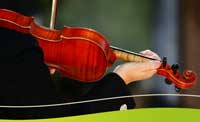A Guide to Great Music Practice
Music teachers and directors are very important for anybody who is trying to become a better musician, but teachers cannot make you a better musician; they can only tell you how to improve.
The actual improvement, you have to do yourself, and mostly on your own time.
Your private (or group) lesson time is the time that you show your teacher how you are doing at the moment, and the teacher will tell you what you need to work on next, and how to work on it.
You don't really have time to practice or improve during your lesson, only to get the insight into how to improve.
Your group rehearsal times (band, orchestra, choir) are mainly for the improvement of the group and for practicing playing together. Again, there is no time for you to actually work on learning the music or on becoming a better singer or player.
Performances (individual or group) are for letting everyone enjoy the progress you have made. You should enjoy them, too, and not have to be worried about the technical details of the music.
None of these times are ideal for actually making progress, so even if you show up for every lesson, rehearsal, and performance, you will have no time to improve!
Individual music practice is absolutely necessary if you want to become a better musician.
Your teacher should give you guidelines on how often and how long to practice as well as what to practice.
If you do not have a private teacher or if the guidelines are vague, you will find some useful tips here.
Don't be afraid to ask your teacher or director for suggestions or clarifications.
If you do not have a private teacher due to money or time constraints, consider getting lessons for a short time (for example over one summer) when you will have plenty of time to practice between lessons. Or see if you can find a teacher who is willing to give you lessons less often than usual.
It is important not just to practice, but to practice well. You can practice daily and still make very slow progress if you are not practicing well.
To make the most progress with the least effort, your individual practice time should include the following.
The Ideal Individual Practice
- Set goals
Your practice should have long-term, medium-term, and short-term goals.
- Set practice times
Your teacher or director should tell you how often and how long your individual practice times should be.
- Warm up
Singing and playing musical instruments are physical activities, and warming up is just as important to the musician as it is to the athlete.
- Work on it
Once you are warmed up, get out the hard stuff and work on it.
- Cool down
End your practice time by playing or singing something you like that is easy for you.
- Evaluate
What progress did you make on the difficult stuff.
Start to Read STEP 1 - Set goals
Catherine Schmidt-Jones attended Rice University, completing a B.A. in chemistry as well as the B. Music and M. Music. Currently teaching brass and guitar privately. Further information can be found at connexions.
|

